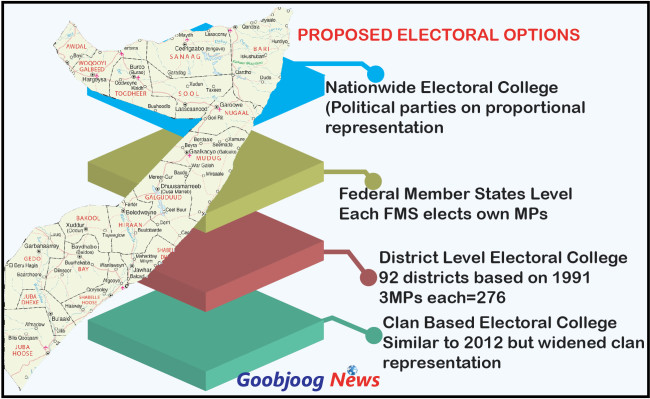Consultative Forum to settle for one of four electoral options ahead of 2016

The National Consultative Forum has zeroed in on four electoral options after the government dropped the one-person-one vote option owing to logistical and security concerns.
The options, which were presented at the first National Consultative Forum, NCF today as part of the Guiding Principles of the process sets the framework on constituting or selecting an electoral college which will in turn elect the Federal Parliament.
The NCF’s primary role will be to settle on the most appropriate 2016 electoral process as well as preside over the process leading to transfer of power in 2016 based on the principle of consensus.
The Guiding Principles which were endorsed at the High-Level Partnership Forum in July emphasises that the electoral process of 2016 shall ‘exhibit enhanced legitimacy’ through a broader, more inclusive process that is representative of the Somali society.
Options
The first option envisages the formation of a national electoral college which will elect all 275 MPs based on nation-wide political parties with an electoral system of proportional representation. This option provides a progressive process which is anchored on political party system.
Alternatively, the federal member states will form the basis of the electoral college based on existing and emerging Federal Member States, FMS which will elect MPs representing their respective FMS. There are four regional states-Puntland, Galmudug, Jubbaland and Southwest. Somaliland has since dismissed this process but NCF factors in as part of the regional states. Middle Shabelle and Hiiraan is yet to be formed as a state while the status of Mogadishu is also yet to be determined. However all the election options take into consideration the participation of the two regions as equal partners.
The third option involves the 1991 administrative divisions in which case each of the 92 districts will elect MPs. In this formula, each district will be allocated three seats totaling 276.
4.5 model
The final option will be drawn from the 2012 formula which is based on clan system in Somalia. A total of 135 elders drawn from all clans using the 4.5 formula elected MPs of parliament who ultimately elected the president. Under the 4.5 model, each of the four major clans takes the value of one while all the minority clans are represented as half. This model was credited for delivering an end to the Transitional Federal Government in 2012. The NCF however proposes a widened clan representation.
The National Consultative Forum is composed of the president, Prime Minister, presidents of the FMS, 25 Federal MPs, Federal Ministers, senior representative members from the legislative or the executive from FMS and civil society. It will also include proportionate representation of women and minorities.
Observers
International partners led by the UN will play observer, mediation and dispute resolution role. The Guiding Principles also mentions the National Leadership Forum whose composition has not been disclosed but will play an appellate role to the National Consultative Forum.
The NCF’s primary role will be to settle on the most appropriate 2016 electoral process as well as preside over the process leading to transfer of power in 2016 based on the principle of consensus.
Another body, the Taskforce will support the NCF by advising on and ensuring implementation of the consultative process and will be chaired by the Prime Minister.
The Technical Support Team led by the Ministry of Interior and Federalisation Affairs will serve as the main technical advisory team to the NCF Task Force.
Somali-led process
Speaking during the Forum today, President Hassan Sheikh Mohamud praised the process as a product of wide consultation and participation of Somalis.
“Today I want to tell the Somali people that we have everything in our hands; gone were the days when decisions for Somalia came from outside this country. I would like to thank all Somali leaders who are here today for their determination to resolve Somali political problems,” said Mohamud.
The president said the country has for the last three years been working on delivering the three core pillars of Vision 2016- state formation, constitutional review and democratisation of the country.
UN Special envoy Nicholas Kay praised Somalia for the steps taken so far in ensuring the 2016 promise of ensuring change of guard is clearly taking shape.
“Today’s Forum meeting is a great showcase for Somalia. This event is Somali-led and Somali-owned, and it is in Somalia. You are showing the world that you are on course to deliver your commitment to respect the provisional federal Constitution and hold an electoral process in 2016.,” said Kay.
Kay also called for action on the formation of Hiraan and Middle Shabelle state whose formation was put off in late August days before it was slated to start on September 3rd. “Only Middle Shabelle and Hiraan remain and I urge clear progress on that process before the next UN Security Council meeting on Somalia on the 9th of November.
The Task Force will conduct regional consultations involving the participation of regional assemblies, elders, civil society, community leaders, business community, women, youth and minorities.
The NCF will convene in December to make final decisions on the most appropriate electoral formula.